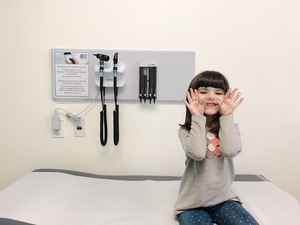Key points
- Many people, especially men, avoid routine healthcare check-ups and preventive screenings, often rationalizing that they're unnecessary if they feel fine.
- The COVID-19 pandemic has exacerbated the avoidance of healthcare, with one in five individuals skipping potentially urgent care during lockdown.
- Encouraging partners to schedule and attend preventive care appointments can be crucial in catching serious health issues like cancer in early, treatable stages.
- Initiating conversations about health can be challenging, but strategies like expressing care, sharing facts, and offering to attend appointments together can be effective.
- Some strategies to encourage a partner to seek healthcare include leading by example, presenting them with all the facts about the importance of preventive care, and helping them find a healthcare provider they trust. Online platforms like Solv can also be a useful tool for initiating control over one's health.

It’s fair to say certain topics are easier to broach in the context of a romantic relationship than others. When your partner leaves dishes in the sink or drawers open, for instance, chances are you find a way to address the issue without much hesitancy. But if your partner refuses to make a doctor’s appointment or seek out routine preventive health care, initiating open, honest conversation might be a bit tougher.
According to NIH, research has shown that individuals will go to great lengths to avoid the doctor’s office and will make any number of excuses, including the notion that there’s simply no reason to seek care, or the expectation that any existing illnesses will go away on their own without intervention. There do seem to be differences among the sexes when it comes to avoiding care: one oft-cited survey run by the Health Information National Trends Survey, found that three times as many men as women failed to see a physician in the previous year and a third of men did not have a regular doctor to visit when they were sick or needed medical advice, compared with 19 percent of women. But this is an issue that crosses all demographic lines — and it’s only been exacerbated by the COVID-19 pandemic. According to a study published in the journal PLOS Medicine last fall, one in five individuals avoided healthcare during lockdown, often for potentially urgent symptoms like palpitations and chest pain.
Solv’s Chief Medical Officer, Rob Rohatsch, MD, says these stats don’t surprise him. “We know that women in households typically are the decision makers around health care appointments,” he says. “In today's society, it's easy to rationalize skipping preventive screening tests as we strive to manage our busy lives. It can be helpful to have a significant other proactively offer to facilitate scheduling preventive care appointments. This works both ways, by the way; partners should encourage each other to seek out self-care.”
How to convey the importance of routine healthcare to your partner
But the biggest hurdle for many loving partners is to convince their counterpart that they still need regular check-ups and preventive services even if they feel “fine.” So what’s the first step in breaking through that commonly-held belief that healthcare is solely reserved for those who are sick? According to Rohatsch, emphasizing the absolute necessity of routine screenings and regular tests is a helpful starting point.
“Many types of cancer in men are treatable if caught early, but the tricky part is that early stages of cancer are often symptom free,” Rohatsch says. “So it's the screening tests that really do the trick, because we are looking for something that has not caused any physiological derangement yet. Colon cancer is one of the most preventable cancers in the world — with proper screening.”
Tips for starting the conversation
Initiating a conversation around a partner’s health can be tricky — particularly if that partner insists they’re perfectly fine. But every person, of every age, gender, sexual orientation, etc. requires routine care and conversation with a health professional who is compassionate, informed, and empathetic. While broaching the topic can pose some challenges, Rohatsch says there are a few simple strategies to sidestep confrontation and minimize the risk of anger, defensiveness, or anxiety. “Start with ‘I care about you,’” he says. “Set the stage with facts. Most cancers are preventable, but asymptomatic early on. And offer to go to the appointment with your partner since this can be a scary time.”
If you need some more actionable steps, the team at Solv has compiled a list of ideas to help convince your partner to make that healthcare appointment:
- Lead by example. Share the ways you prioritize your health and the reasons why you make well-being a focus of your energy.
- Present them with all the facts. It’s understandable that some men might have fear or anxiety around seeking care or even scheduling standard screenings. But Rohatsch says becoming educated about the importance of these preventive services and what they truly entail can go a long way in keeping men of all ages as healthy as possible for as long as possible. “Many men would rather avoid a colonoscopy or digital rectal exam if they can, but these are painless procedures that can catch colon cancer early and prevent premature death,” he says. “Men often don't know how prevalent prostate cancer is: each year over a quarter million men get prostate cancer and approximately 35,000 die.”
- Help them find a provider they trust. If your partner doesn’t have a provider they trust, offer to help them find one. Or suggest they take the first step by getting something that’s been bugging them handled via Solv, which offers in-person and video visit services in over 40 states. This can help them start taking control of their health and empower them to take further action if necessary.
FAQs
Why do some people avoid routine healthcare check-ups?
Many individuals, particularly men, often rationalize that they don't need to see a doctor if they feel fine, or they expect any existing illnesses to resolve on their own.
How has the COVID-19 pandemic affected people's healthcare habits?
The pandemic has worsened the trend of avoiding healthcare, with a study showing that one in five individuals avoided potentially urgent care during lockdown.
How can I encourage my partner to seek routine healthcare?
You can emphasize the importance of preventive screenings, share facts about health risks, and offer to accompany your partner to their appointments.
What are some strategies for initiating a conversation about health with my partner?
Start by expressing your care for them, present facts about preventable diseases and the importance of early detection, and offer to go with them to their appointments.
How can I help my partner find a healthcare provider they trust?
You can offer to assist them in their search for a provider, or suggest they start by addressing a minor health concern through a service like Solv, which offers in-person and video visits.
How can one initiate a conversation about health with their partner?
Initiating a conversation about health with a partner can be done by expressing care and concern, presenting facts about preventable diseases, and offering to accompany the partner to the appointment. It's important to approach the conversation with compassion, understanding, and empathy to minimize the risk of anger, defensiveness, or anxiety.
What are some actionable steps to convince a partner to make a healthcare appointment?
Some actionable steps include leading by example, presenting facts about the importance of preventive services, and helping them find a healthcare provider they trust. Using services like Solv, which offers in-person and video visit services in over 40 states, can also be a helpful first step.
How prevalent is prostate cancer among men?
Prostate cancer is quite prevalent among men. Each year over a quarter million men get prostate cancer and approximately 35,000 die. Regular screenings can help detect this cancer early and prevent premature death.









